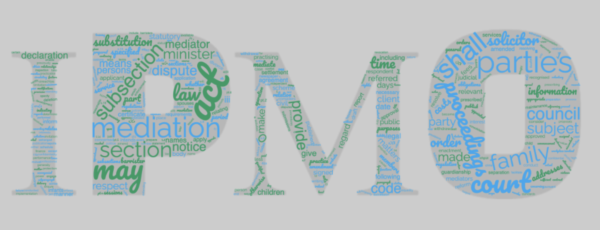I recently was interviewed by Dr. Roisin O’Shea, the Chair of the Irish Professional Mediators’ Organisation. (IPMO) The interview was one of several commemorating International Mediation Awareness Week.
 It is fascinating to learn the different ways jurisdictions tackle the access to justice and court backlog challenges of our times. And to see how the way in which family mediation has evolved in a given jurisdiction determines, to a large extent, the way in which the service is understood and provided there.
It is fascinating to learn the different ways jurisdictions tackle the access to justice and court backlog challenges of our times. And to see how the way in which family mediation has evolved in a given jurisdiction determines, to a large extent, the way in which the service is understood and provided there.
Mediation has long been considered an important part of the family law system. It is one way that separated couples can try to resolve the issues that require attention when parties and parents separate.
In Canada, family mediation has evolved organically, from the ground up. Mediators were borrowing Indigenous dispute resolution processes (often without credit) by the 1970s. Family mediation in Ontario’s legal system originated with mental health professionals seeking to support families achieve good outcomes outside of court.
In the early 1990s, the Federal Government, through the Department of Justice, funded the creation of Family Mediation Canada (FMC), building on an existing base of experienced family mediators. FMC established Standards of Practice that reflected what mediators were already doing: screening for family violence, providing non-evaluative processes of self-determination, encouraging communication skills such as active listening and non-judging re-framing, focusing on the child’s best interests and encouraging legal advice.
Fundamental to the genesis of family mediation in Canada was a belief that mediation must be a voluntary and safe process of self-determination in order to be both empowering and effective.
Over the years, this approach to family mediation became entrenched in the Ontario family law culture. The Ontario Ministry of the Attorney General established a model of voluntary court-connected mediation that reflects this approach; these services are now available in most family courts in the province. While judges have the ability to order parties in court to a free intake meeting to be screened for family violence and power imbalances, mediation itself remains optional.
Credible and successful voluntary membership organizations grew alongside this evolution, providing certification requirements, ongoing support, best practices guidance, voluntary adherence to Codes of Conduct and training for family mediators. Today the Ontario Association of Family Mediation and the Family Dispute Resolution of Ontario in particular provide excellent guidance , training and support for their many hundreds of accredited members practising family mediation.
Family mediation has evolved very differently in Ireland, where the government recently passed a Mediation Act. Although the regime in Ireland is also a voluntary one, judges have the ability to “invite” parties to consider mediation, and also the ability to penalize a non-participating party with a costs award. Family mediators there are just starting their journey of establishing training and best practices standards.
I was grateful to be able to share some of my thoughts about how family mediation can best meet the needs of families going through a separation.
I am not a supporter, for example, of mandatory mediation in family matters. Not only because voluntary mediation is likely to produce more durable outcomes. But also because most mandatory mediation regimes include an exception for cases involving domestic violence without realizing the risks inherent in doing so.
This approach requires a survivor of family violence to ‘out’ themselves in order to avoid having to negotiate with a person who is dangerous to them and/or their children. Research tells us however that many survivors of the highest-risk forms of IPV will not disclose that risk without extensive safety planning in place to support them. And few if any mandatory family mediation regimes have built in the safety planning support required to allow survivors to safely disclose the truth.
The choice of mandatory family mediation leaves these (usually) women is a lose-lose: disclose the violence and expose themselves to a real risk of retaliation, or stay quiet and participate in what is likely to be a coercive and re-traumatizing experience leading to an unfair outcome.
In my discussion with Roisin and other members of the IPMO, we considered whether mandatory referral to mediation intake is the better option. This would require all litigants to meet, separately and confidentially, with a trained intake worker or mediator, someone who would screen for power imbalance and family violence, implement any safety planning that is appropriate and help the parties determine whether mediation is a better and safer alternative, for their family, than attending court.
This approach supports what we know from experience in Ontario: when parties meet with a mediator for a confidential intake and screening meeting, they feel able to share the important information the mediator needs to design a safe, empowering and effective process for them. Parties who attend mandatory intake meetings are likely, in most cases, to want to proceed to mediation because the intake meeting has addressed their fundamental procedural need to feel safe, supported, and ready to bargain effectively.
We had a wonderful and wide-ranging conversation about many other important aspects of family mediation—- and I appreciated it very much.

